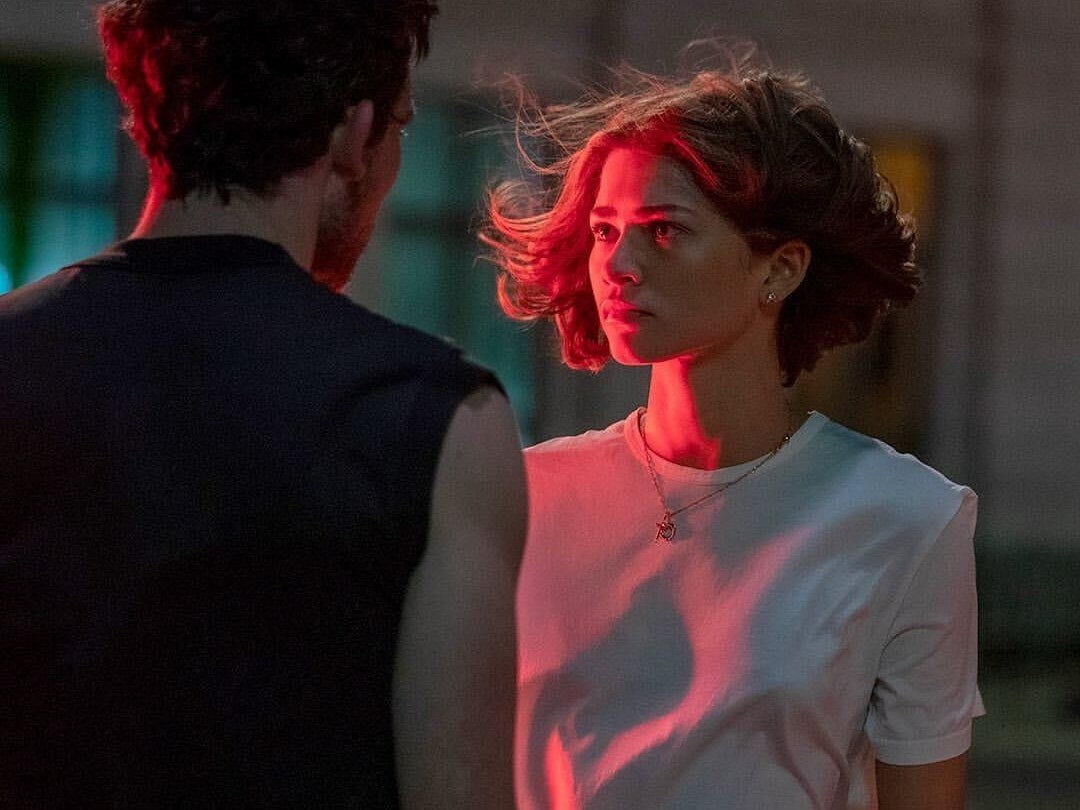Sports movies are really, really queer. Sometimes, it is purposeful. Other times, it is accidental. I don’t know about you, but I can’t possibly watch a movie with two men, usually at the pinnacle of their masculinity, face off and not see at least some gay subtext. Look, just go back and watch…any of the Rocky movies with the late, great Carl Weathers as Apollo Creed. Is it a beautiful friendship? Yeah, sure. Is it also almost something more? A thousand times yes. And that brings us to Challengers highlighted here)
Challengers is, supposedly, a film about tennis and rivalry. But, like most movies vying to be great, is never just about what the plot tells you. This is a movie about power and control. A movie about growth, and passions denied. It features Tashi (Zendaya), a young tennis phenom who is also the object of affection of both Art Donaldson (Mike Faist) and Patrick Zweig (Josh O’Connor). It takes place over a handful of times in their lives; as youths, as adults in a Challenger tournament, and one other period in Atlanta.
Everything we thought we knew about this movie was focused on sex, relationships, and passion. Maybe minus the sex, Tashi would tell us that this is what tennis is about, too. And it should be noted that, despite numerous sexual situations, there is no sex shown on screen. An interesting, and good, choice by director Luca Guadagnino, which keeps the audience searching, leaning in, hoping for more. Speaking of the direction, and the cinematography by Sayombhu Mukdeeprom, my goodness, some choices were made!
Strangely, this does not feel like it was made by a seasoned director. So many visual options exist on the screen that it starts to feel like he doesn’t know what he wants. First person tennis ball shots, rotating cameras, strange close-ups, the list goes on. None on them are bad on their own, but it starts to feel exhausting. Which is a shame, because the performances are good enough on their own. Especially when paired with the pulse pounding, truly awards worthy score from Trent Reznor and Atticus Ross. Seriously, I want it playing in the background forever.
Despite the focus on sexuality, Tashi is both separate and connected to this. It is rare that we see, sans judgment, a female character who is dedicated to power, control, and not falling in love. After all, “What makes you think I want someone to be in love with me?” Tashi is consistently plotting, she knows the boys’ next move, next thought; just as she does her opponents on the court. She reads Art and Patrick as lovers, even if they cannot. In a scene that leads us to believe that we are going to see a threesome, Tashi is a puppeteer. She uses her sexuality, and their desire, against them. She sets them in motion and promptly leaves after accomplishing her goal.
Even in later sequences, when married to Art, she is not exactly loving. She can turn it on when she wants to, like when she caters to their daughter. However, there is a scene, a heartbreaking one, in which Art, worn down by pressure, asks her to hold him until he falls asleep. She does it, but under duress. You can see in her eyes that she has no interest in this side of Art. It is weak, and she knows that, had she been healthy, she would never be this way. She can be seen as cold, ruthless, and cruel. But how many male characters have we celebrated in this way?
Of course, the most important relationship of the movie is between Art and Patrick. Despite growing up together (and “maturing” together), they are drastically different, and this fosters their growing rivalry. Tashi may be the lynchpin, but it was always there. Patrick is brash, confident, and pushes boundaries. Art is sweet, talented, and genuinely kind. Yet, that friendship works and is complementary. It is no surprise that what splits them asunder is Art thinking that Tashi is too good for Art and coming to her defense after her injury. But that does not alter the clear raw attraction they have for one another.
This is where, depending on your perspective, the film can go a bit off the rails. The constant flirtation, which has some connections to reality, is over-the-top, and purposefully so. I am not sure that anyone besides Patrick has ever bitten a churro with quite that much gusto. And yes, the churro symbolizes what you think it does. And that doesn’t even begin to touch a scene in a sauna with the two barely clothed men. These scenes are fun, aggressive, and yes, more than a little silly.
The final match, spread throughout the film, due to the flashback format jumping around in time, is mostly masterful. The build of the match is the build of the movie, due to expert plotting from screenwriter Justin Kuritzkes. But I feel that Guadagnino felt the pressure of making the final 20 minutes so memorable that he loses it a little bit. There are moments of breathtaking genius within it. Watching Zendaya expressionless as others in the crowd follow the action is very smart. This is not tennis, this is their lives on display. There is another particular shot with the back of Tashi framed between the two male leads that is seared in my memory. However, there is an overreliance on slow motion and a telegraphed moment with Patrick’s serve that should have come to fruition just a bit sooner.
This is a going to be a “your mileage may vary” kind of movie. It is so close to great. If there was a bit more character work on Patrick (besides sexy jerk) and a more restrained final set of moments, it is there. Challengers is packed with passion, romance, power, and psychological warfare. All in all, a victory for all involved, especially Zendaya and Faist.








Great review, Dave!